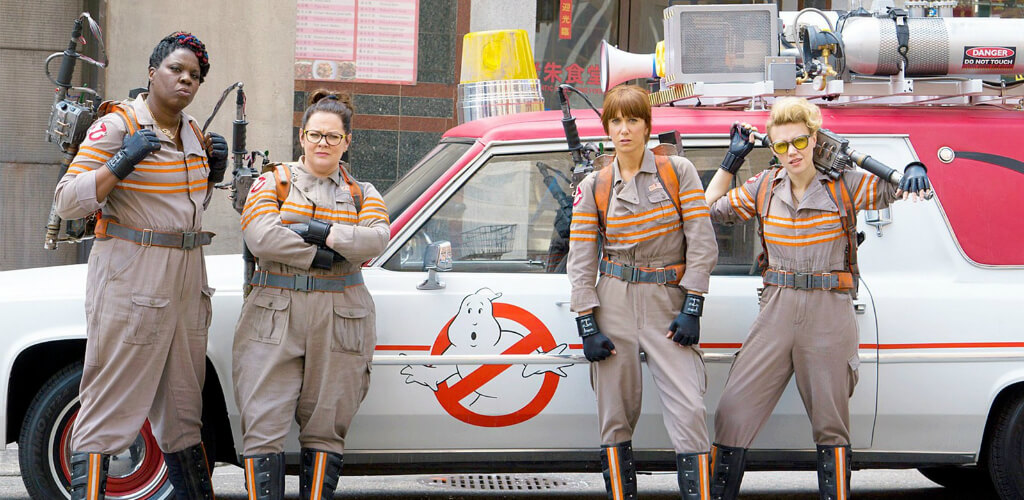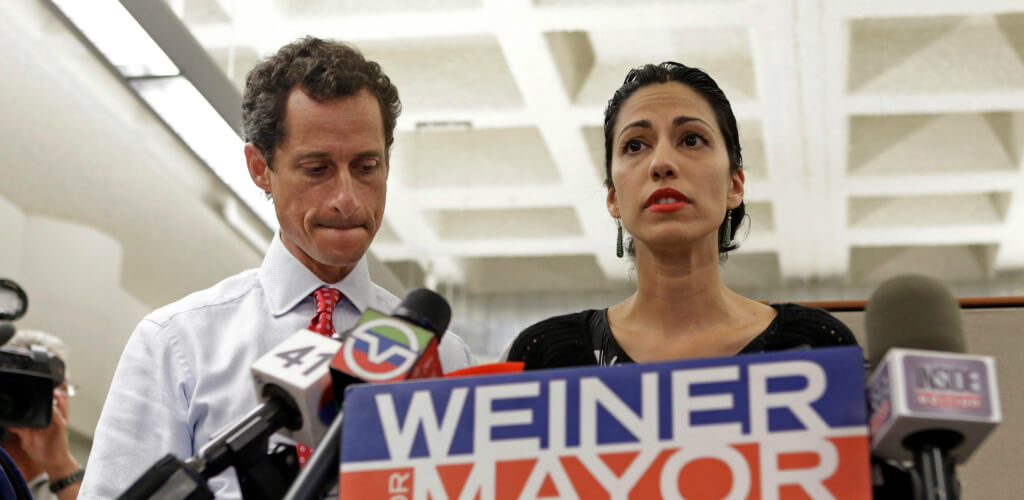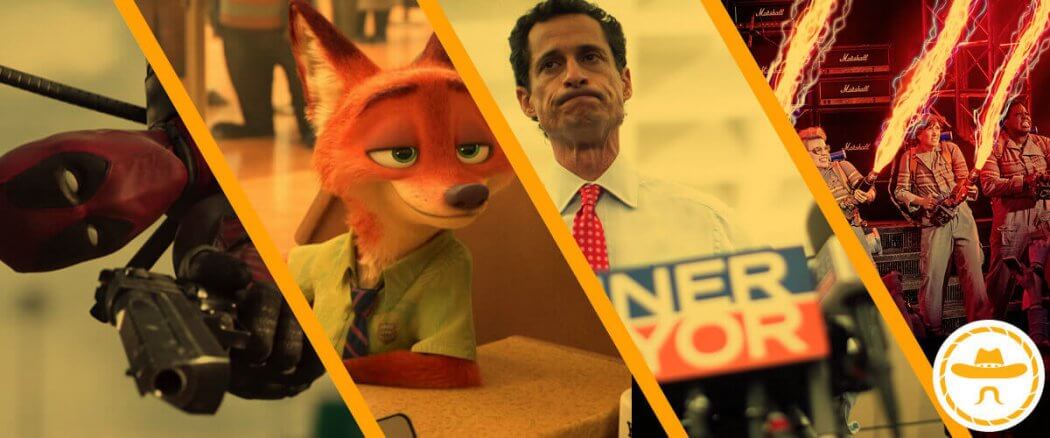At Cinema Faith, we wish we could provide feature-length reviews for every movie that hits theaters. Unfortunately, some films fall through the cracks. Welcome to another edition of Mini-Review Roundup where we present smaller reviews of several movies at once.
This month we review Ghostbusters, Weiner, Deadpool, and Zootopia.
Ghostbusters

The reaction to the Ghostbusters reboot was intense. Prior to the film’s release, people stormed social media to voice their complaints. Many were irked by the absence of the original cast in starring roles. That’s understandable since the original foursome’s return for a Ghostbusters III has been teased off and on for the last 27 years. But more surprising was the backlash toward an all-female cast. Would anyone have batted an eyelash at an all-male reboot with Seth Rogan and the gang? Of course not, which proves how far we still have to go in the fight against sexism.
Still, at the end of the day all that matters is the quality of the film. Nothing silences the haters faster than an exceptional product. Unfortunately, Ghostbusters wasn’t able to silence its critics because the film is a mixed bag. The cast isn’t the problem. Melissa McCarthy is the perfect choice for the anchor of the crew, Abby. McCarthy has carved out a unique comedy niche for herself, playing sweet-natured women who defeat evil with a well-timed “darn it.” And the rest of the four — Kristen Wiig, Leslie Jones, and Kate McKinnon — are more than up to the task.
The problem is the execution by director Paul Feig. The original Ghostbusters was a perfect blend of comedy and horror. The movie was genuinely disturbing and genuinely funny. 2016’s Ghostbusters falls short on both accounts. There’s no question the film is hilarious at times, but for every joke that works there’s one that doesn’t. The script lacks the razor-sharpness we’ve come to expect from comedy in the post-Judd Apatow era. And as for scares? They’re non-existent. For better or worse, the movie feels like a two-hour Saturday Night Live skit. The plot is artificial. The special effects are laughable. Just like SNL, everything exists for the next joke. But unlike SNL, feature films need more than punch lines.
For all of its feminist bravado, decriers of sexism could make a case against one character in the movie: Chris Hemsworth’s Kevin. Kevin is the secretary at Ghostbusters headquarters. Kristen Wiig’s character fawns over his good looks from minute one, but the foursome quickly realize that Kevin isn’t the brightest crayon in the box. The writers are purposely reversing the gender of the “sexy bimbo” that shows up in male-dominated films, but in doing so, even ironically, aren’t they guilty of the same? That’s a debate worth having, but from a film perspective, Hemsworth is the best thing about the movie. His dance through the credits at the end singlehandedly moved up my grade by a half-letter. Hemsworth embodies the spirit Feig is after — big, broad, goofy fun. That isn’t enough to rival the classic status of the original, but for pure summer escapism Ghostbusters answers the call.
Grade: B
Weiner

“The name of a man is a numbing blow from which he never recovers.”
This is the quote that opens the film, perfectly addressing the first thing on our minds as we sit down to watch a documentary called Weiner about a disgraced politician busted for texting pictures of his, well, wiener to various women around the globe. Anthony Weiner admits he has a “funny name” and partially blames it for turning away voters. But names can be overcome. What define us are the choices we make, and Anthony Weiner has made some terrible choices.
Weiner wasn’t always a punch line. In fact, he was once hailed a hero in congress for fighting bullies and looking out for the little guy. He’s a natural politician, capable of firing up a crowd and delivering electric energy when it matters most. But Weiner is a natural politician in another way too — scandal follows him like a plague.
Weiner is so intimate, it’s embarrassing. The film feels like TMZ at times, with the camera intruding on the most personal of encounters. Unlike TMZ, however, Weiner doesn’t mind the cameras. In fact, he seems to want them there. Sure, he feigns annoyance at times when the going gets rough, but always with a smile. The film is a rare and eye-opening look at behind-the-scenes politics. We see the excruciating donor calls, the campaign squabbling, the real-time reactions to scandals as they unfold — the camera doesn’t flinch, though we do. Weiner may not mind the cameras, but they still feel exploitive at times. What a gig for directors Josh Kriegman and Elyse Steinberg. They were given full access to one of the great political meltdowns of our time. We may feel dirty participating, but the footage is gold.
The most compelling character in Weiner isn’t Weiner himself, it’s his wife Huma Abedin. Huma has been Hillary Clinton’s most trusted aide for years. She’s a sophisticated and respected political insider tethered to a sinking ship. Huma wants to believe in her husband, but he can’t stop letting her down. The most excruciating encounter comes when one of Weiner’s former sexting partners shows up at a campaign event with Howard Stern’s camera crew to “confront” him. The contrast between the two women is staggering. Weiner’s mistress waits for him downstairs, dressed in heels and a smile, reveling in her 15 minutes of fame. Huma waits upstairs, her eyes closed and head shaking, as her team plots an escape route. Weiner’s sin comes back to taunt him, and it’s his wife who suffers most.
But Huma isn’t the only one burned by Weiner’s infidelities. His past took on new significance just a few weeks ago in the presidential election. The FBI discovered e-mails on Weiner’s computer that supposedly shed new light into Hillary Clinton’s server scandal. This prompted FBI director James Comey to release a statement a week before election day that some believe thwarted Hillary’s momentum. If that’s true, it means Anthony Weiner is partially responsible for President-Elect Donald Trump. Weiner didn’t just ruin his career, his marriage, and his reputation. He also ruined America.
Grade: B+
Deadpool

We live in the age of the superhero and Marvel is to blame. Iron Man was the beginning of an all-out invasion of comic book media, and 8 years later the brand is as popular as ever. The reason? Quality. Everything Marvel touches turns to gold. But as Josh points out in his review of Doctor Strange, even the best formulas can buckle under the weight of expectation. It’s time for a shake-up. It’s time for a movie like Deadpool.
Deadpool turns the superhero genre on its head by breaking all the rules. The film announces its tone from the start. An opening credit sequence shows bullets flying through bodies in slow-motion with snarky captions like “Directed by An Overpaid Tool.” The overpaid tool in question is Tim Miller. Miller brings the attitude. His writers bring the clever. The script is sharp and meta:
Deadpool on the importance of good looks: “Do you think Ryan Reynolds got this far on his superior acting method?”
Deadpool on being taken to Professor X: “McAvoy or Stewart? These timelines are so confusing.”
The movie is also graphically violent and profane, a raucous deviation from Marvel’s PG-13 fare. But that was always going to be the case with a hero like Deadpool, because Deadpool is not a hero. He tells us this up front — breaking the fourth wall, of course, because that’s what anti-heroes do. Ryan Reynolds is perfect in the title role. You can tell he’s having fun, as if this is the character he’s been waiting to play his entire career.
But this is not a perfect film. For one, the stakes aren’t high enough. This is a movie about a man trying to get his good looks back. A far cry from saving the world. For two, Deadpool is surrounded by generic characters. Yes, the villain is a jerk and we want him to fall, but he’s far from memorable. And being part of the X-Men universe, Deadpool teams up with two mutants. Not the cool ones though. Instead, we get a goofy oaf named Colossus and a bratty teenager named Negasonic Teenage Warhead. There’s also a love interest, but we never buy into their romance because Deadpool is far more in love with himself.
Deadpool is also offensive. And in a way, its boldness is impressive. Did he really just say that? Can he say that? But like all cinematic junk food, we start to feel sick toward the two hour mark. The movie isn’t offensive because Deadpool drops F-bombs and we see boobs. The movie is offensive because it scoffs at goodness and celebrates evil. Colossus gives Deadpool a speech about showing mercy to enemies, but Deadpool shoots the enemy before Colossus can finish because he takes too long to make his point.
I hope future installments raise the stakes and give Deadpool a conscience. But there I go again trying to turn Deadpool into higher art when it’s aiming for just the opposite. Miller knows what he wants and he also knows it works. The $760 million domestic box office should be enough to convince those still skeptical. I’ll admit that a clever send-up of the comic book genre is hard to resist in these superhero-saturated times. I have no intention of consuming Deadpool again, but that’s also what I say every time I eat a donut. Just like vanilla frosting and sprinkles, a sequel will be hard to resist.
Grade: B
Zootopia

Every year an animated film comes out that rivals its live-action counterparts in every major Oscar category. Last year brought the incredible Inside Out. This year brings Zootopia. The problem for Oscar hopefuls is that studios have to choose between Best Animated Film or Best Picture. They can’t submit to both. I don’t blame Pixar for settling on the sure-win category last year, but it’s time for the Academy to change the rules. Inside Out should have been a Best Picture nominee. Period. And though Zootopia falls short of Pixar’s heights, it’s currently #5 on our top ten of 2016.
Zootopia takes place in an alternate reality where humans don’t exist and animals live like us. Judy Hopps is our main character, and she’s a classic underdog. Or rather, underrabbit. Judy wants to be the first rabbit police officer. Everyone laughs at this, but Judy proves them wrong by graduating at the top of her class. And yet, the laughs continue as she reports for duty at the Zootopia Police Department. No one believes in her, least of all her chief. But a case involving a missing otter has the potential to change that for good.
The animation in Zootopia is outstanding. I’m sure there are some nostalgic for the hand-drawn days, but advances in computer technology have created the perfect palette. Zootopia is a movie that would be impossible to make as a live-action film. Costumes and green-screens only go so far. Animation makes the impossible possible, and computers render the image so clear we feel we’re watching reality.
The voice work is top-notch too. Ginnifer Goodwin gives Judy the warmth and determination her character needs, and Jason Bateman’s smooth voice is the perfect match for Nick, a sly fox that partners with Judy to crack the case. The movie is fun and laugh-out-loud funny. (Special mention to the DMV employed by sloths — one of the best scenes of the year.) Unfortunately, Zootopia loses steam toward the middle at the arrival of Mafioso, Mr. Big. The tone turns chaotic and the plot convoluted, but the friendship between Judy and Nick carries the movie to the finish line.
What really makes Zootopia stand out, though, is the powerful depiction of how fear can lead to prejudice. One of the major mysteries of the plot is why a group of predators are turning savage and resorting to their animal instincts. Judy comes to the conclusion that there must be something inherent in the predator DNA feeding this compulsion. This causes panic throughout Zootopia and suspicion toward all predators. Judy soon realizes, however, that the pull toward savagery is a tendency inside all of us.
What a relevant message for our time. We just endured an election run entirely on fear. Donald Trump taught us to fear immigrants and Muslims. Hillary Clinton taught us to fear Donald Trump and his followers. But fear of “the other” gets us nowhere. The line between good and evil runs through all of our hearts. The Publican in Luke 18 thanked God that he wasn’t like the sinner. The sinner beat his breast and prayed for mercy. Only one went home justified.
Judy closes Zootopia by exclaiming, “Change starts with me. It starts with all of us.” The fact that this is a children’s movie should fill us with hope. If our kids can grab hold of this truth now, the future is in good hands.
Grade: B+





